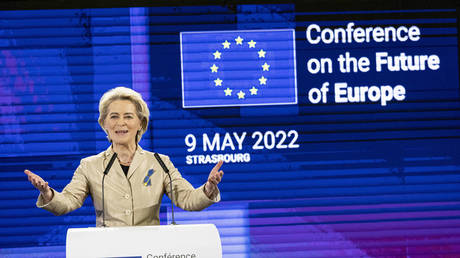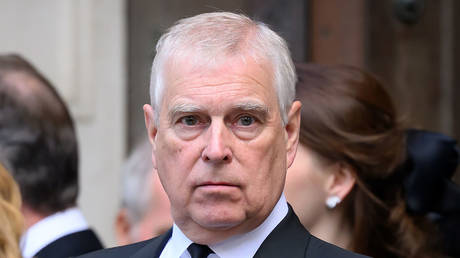
Brussels is looking forward to receiving Kiev’s answers to the union membership questionnaire, the EU Commission head says
The future of Europe is that of Ukraine as well, the European Commission head, Ursula von der Leyen, told the European Parliament in Strasbourg on Monday, adding that the “next page” in the history of the bloc will be written by Ukrainians.
The EU Commission chief said Brussels is looking forward to receiving Ukraine’s answers to the membership questionnaire. Earlier, Ukrainian President Volodymyr Zelensky said that Kiev had submitted the 5,000-page document to the EU.
The commission aims to deliver its opinion on the matter in June, von der Leyen tweeted.
However, French President Emmanuel Macron, who was also present at the European Parliament session, warned that Kiev should not expect speedy accession to the bloc. “Even if we gave them [Ukraine] candidate status tomorrow… we all know perfectly well that the process of allowing them to join would take several years… several decades,” he said.
Earlier in May, a similar idea was expressed by Austria’s EU affairs minister, Karoline Edtstadler, who said Ukraine’s accession to the EU was unlikely to happen “in the next five to ten years.”
The French leader said he opposes the idea of the bloc lowering its “stringent” standards just to allow some nations to join sooner. Instead, he suggested establishing another format that would involve those aspiring to join the EU and, in an apparent reference to the UK, those nations that have already left it.
“It is our historic obligation… to create what I would describe before you today as a European political community,” Macron said, adding that this new “organization” would allow “democratic European nations” to cooperate in the fields of politics, security, energy, transport, investment, and infrastructure. The French president argued that the EU cannot remain Europe’s only organizing body, “given its level of integration and ambition.” He did not elaborate, however, on the format this new organization would have.
Both Macron and von der Leyen have also advocated for changing EU treaties. “We need to reform our texts – it’s obvious,” the French president said. Von der Leyen argued that “unanimity voting” should become a thing of the past “if we want to move faster,” since it “no longer makes sense” in certain areas.
The idea, however, faced criticism from EU members that said now is not the time for “institutional discussions,” and called any potential treaty changes “unconsidered and premature.” Those opposing the initiative included Denmark, Sweden, Poland, the Czech Republic, and the Baltic states.
Ukraine submitted the first part of the questionnaire in mid-April. In assessing membership bids, the European Commission evaluates everything from the country’s economic performance to the legal system, along with environmental regulations and agricultural practices. This process can take decades – Turkey has, for example, been a candidate since 1999.
Full membership is also dependent on the unanimous consent of EU member states.




